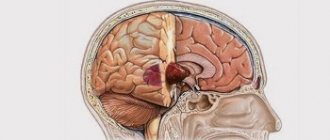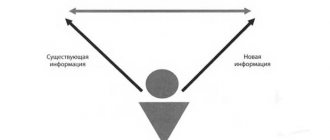Hello to all readers! Lyudmila Redkina is in touch. Perhaps you have met among your acquaintances people who are the life of the party, constantly in the center of attention in small talk, but as soon as they are left alone with themselves, “you can’t pull them out of there by the ears.” I have several good friends around me with similar behavior. I always wondered how this could be: if a person is an introvert, he cannot be so sociable and open, but if he is an extrovert, he will always be ready to communicate and will not protest against it. But there is a third psychotype that was identified relatively recently - ambivert. In the article we will look at who an ambivert is, how it manifests itself, and how to recognize it among other psychotypes.
What does ambivert mean?
The prefix ambi- is used for concepts with opposite meanings. Suffice it to recall ambidexters - both left-handed and right-handed, the concept of ambivalence.
An ambivert is a balanced personality with a fine balance, combining the characteristics of introverts and extroverts. Ambiverts fit well into company and feel great alone. These are people who know how to adapt and develop quite harmoniously under any conditions, but do not depend on the situation.
At first glance, it may seem that ambiverts are more of a norm, from which a person can deviate towards introversion or extroversion. But people who cope well with loneliness, and at the same time know how to navigate in a large company of people, are not the golden mean, but one of the vertices of the triangle.
The fact is that ambiversion is formed due to great sensitivity to stress. An ambivert quickly gets tired of the noisy bustle, and constant loneliness causes him depression, oppression and depression.
What activities are suitable for an ambivert?
We can say that absolutely any activity is suitable for an ambivert. But there are types of jobs that are best suited for them.
Activities suitable for an ambivert should not be monotonous and monotonous. It should involve a change of environment, working in different conditions, traveling to distant cities should be replaced by classes in a warm, comfortable office or room.
Many creative professions seem to be specifically designed for ambiverts. For example, a musician. For some time he composes works, being completely alone, then he practices them, rehearsing as part of his team, and then performs in front of the public. This may be followed by an interview, signing of autographs, and after that a return to the studio. The environment, operating conditions, and the number of people around are constantly changing, and this is what an ambivert needs.
Another suitable industry for people of this type is the service industry; At the same time, an ambivert will show himself best where constant and short-term contacts with people are necessary: he can be a recruiting manager, the head of a small company, a social worker, or an intermediary in concluding deals.
Psychologist Adam Grant conducted extensive research that showed that it is not extroverts or introverts who do best in trading, but ambiverts. For example, they showed the highest percentage of successful sales. According to the psychologist, this became possible thanks to the ability of ambiverts to analyze the situation, act in accordance with the situation and apply an individual approach to clients.
In general, it can be rightly argued that the pace of modern life is more suitable for such people, and not for charismatic extroverts or eternally reserved introverts.
Of course, despite the positive characteristics and advantages of the ambivert personality type, it also has certain weaknesses. For example, great success in various areas of life leads to excessive self-confidence. An even more dangerous trait of ambiverts is excessive sacrifice, when the desire to devote their lives to others suppresses personal interests.
Difference from introverts and extroverts
Back in the last century, Carl Jung divided people exclusively into two types - introverts and extroverts. If we consider the physiology of the phenomenon, the difference is based on the degree of excitability of the cerebral cortex. These properties of neurons are unique to each person.
One of them is no worse than the other, it’s just that extroverts prefer to be in public all the time, they need additional incentives in the form of exciting situations and the emotions associated with them. They direct their energy outward, being interested in others and turning them into objects for their plans, but this type evokes the most sympathy.
Introverts prefer familiar situations and feel comfortable only when alone with themselves. They are easily excitable, so they physically need rest to reduce activity. They do not like to be central figures; they try to think longer before taking decisive action. Life teaches them secrecy, because they can only recover alone. Contrary to popular belief, they can communicate and be friends, but they need time and space for themselves.
Ambiverts can balance in the center of the scale between the first and second, and regulate their own behavior arbitrarily, depending on the situation. You can use your ambivert advantage to develop the strengths of both types through training.
An introvert of the classical type will not be able to pretend to be an extrovert for long, and vice versa, burnout is guaranteed.
Meaning of the term
The sonorous name “ambivert” already contains a clue to the meaning. Many people know, of course, that “ambivalent” is something that can simultaneously have two opposite meanings. “Ambidextrous” refers to people who are equally good with both hands. Similarly, in psychology, the word “ambiversion” means the presence of both characteristics characteristic of introverts and extroverts. This unique combination ensures good adaptation in a very diverse human community. The definition of an ambivert indicates that such a person feels harmonious both in the company of new people and in completely familiar surroundings.
It may seem that this means reaching some kind of golden mean. People do not withdraw into themselves, but they also do not suffer in the absence of communication with the outside circle. However, this is not so: the high pace of communication and maintaining new acquaintances can only be maintained for a short time. Ambiverts may be sensitive to certain statements from people around them. What is important is that such perception sometimes persists even with complete external calm.
Characteristics of the psychotype
On the one hand, this type of personality is a gift of fate; the ability to adapt to different situations allows you to be closer to success. But this property imposes enough restrictions to consider such people ideally suited for communication. Among them:
- An ambivert does not survive active communication at a high pace, maintaining a circle of acquaintances and complying with social requirements for long, then he needs a pause, which confuses acquaintances and colleagues;
- While saving face, the ambivert perceives most remarks extremely painfully, he cannot completely distance himself from catchy remarks, and is also unable to accept them;
Psychologist Ershov - helping women
Ambiverts should not be considered universal soldiers; they are familiar with the complexities of two personality types at once.
Personal qualities
The personal qualities of an ambivert are not a synthesis of the best between the extreme poles of a psychotype, but a completely special character.
Among their qualities there is one unique thing - the ability to withstand monotonous work for a long time, although not as long as introverts. Despite their enormous patience, they are relatively easy-going and know when to take risks.
At the same time, they, as extroverts, are able to make a career and develop in the profession, willingly communicating with clients and with the team.
Ambiverts are clearly noticeable in a group, in contrast to that part of the closed, unsociable people about whom they say: what is there, what is not.
A flexible mind and ability to adapt help ambiverts find elegant solutions where others fail. At the same time, in a difficult situation, they do not boil, do not explode, and do not fall into a stupor.
Behavior
It is impossible to determine how this or that person will behave if we know about him that he is an ambivert. After all, this is only one personality trait out of the top five. Behavior is not determined solely by it. In addition to the intro-extroversion scale, there are four more oppositions:
- in interactions with people, attachment to them and independence are contrasted, and people differ in reactions from competition and indifference to cooperation, trust and respect;
- A person's control over himself may vary. Either the person is relaxed and goes with the flow, or she is trying to keep everything under control;
- playfulness - practicality, in this pair psychologists study how much a person lives in reality and how inclined he is to have his head in the clouds;
- a person’s emotionality is contrasted with restraint; this scale shows susceptibility to depression and stress;
In general, it turned out that for any set of traits, a person with ambiversion on the intro-extroversion scale behaves much friendlier and is more prone to constructive conversation and cooperation.
In addition, the type of temperament will also influence the behavior of an ambivert, while the intro-extroversion scale also affects temperamental manifestations outside. Ambiversion and its influence looks like this:
- The sanguine temperament becomes slightly resourceful and unpredictable; such an ambivert is capable of manipulating people and is prone to adventures. Shortcomings appear: discipline declines, and sometimes temper appears. At the same time, the combination with a sanguine person makes them friendly and patient, they are sociable, although a little disorganized.
- A melancholic temperament combined with an ambivert personality type turns people into perfectionists with a strong will. They are punctual, use people for their own purposes, are ethical and do not forget about the interests of others. Their rigidity and criticality sometimes makes them lose flexibility. At the same time, they make good leaders, they are polite and are able to imitate the right emotions.
- The phlegmatic temperament makes ambiverts oriented towards communication without unnecessary emotions, they are calm and modest, they make ideal couples who adapt to the leader both in work and in the family. Their problem is painful ethics and devotion, when they need to remember their own interests.
- Choleric temperament turns ambiverts into workaholics. They have a strong will and passion for achieving goals; they love criticism and use it to their advantage. They love a challenge and are excellent planners. The problems of choleric people are their tendency to be quick-tempered; they are domineering and jealous, often vindictive.
Psychological diet: weight loss technique
It happens that temperament is very weakly expressed; in such a situation, an ambivert can be similar to a phlegmatic person or a rational introvert. Such a person has enough energy and does not depend on other people. Psychologists have already identified them as a separate personality type, defining it as a tetravert.
What they look like
Recognizing an ambivert by appearance is easier than it seems. How do they differ from the extremes of the scale? Let's look at them first to better understand the differences. At extreme values of extroversion and extroversion, the expression is as follows:
- extroverts - clean and smelling delicious, with attractive makeup and combed hair. Clothes are new or fashionable, they are mouth-watering candies that everyone wants;
- introverts hide in clothes, often choose oversized clothes, try not to smell or attract attention to themselves. They have neutral makeup, comfortable clothes, which are enough to be decent. They hide their inner world, so they do not strive to decorate themselves with diamonds or tattoos;
Ambiverts change styles depending on their own goals. In addition, they allow themselves to wear jewelry with meaning, T-shirts with meaningful images, and express belonging to a subculture. They can dress fashionably, but at a level of fashion that has not yet become widespread;
While extroverts act sexy and try to be cute, introverts slouch, ambiverts may look a little out of this world - but they are at peace with themselves. Often they choose a style that is expensive, but little, but in no case expensive-rich. But even in a potato sack, an ambivert will suddenly find himself the bearer of a conceptual style.
Ambiversion in psychology
Psychologists are accustomed to identifying opposite traits in psychological portraits of people: extraversion and introversion.
This division was traditional in psychological science, and the terms are familiar to everyone and do not raise questions. However, recently scientists have discovered another personality characteristic - it is called “ambiversion”.
Two poles
According to Jung, humanity (very conditionally, of course) is divided into those who love communication and literally cannot live without it and those who prefer loneliness.
There are people whose “core” of character is extroversion, that is, a constant need for communication, openness to the world. Extraversion is a behavioral type directed “away from oneself,” outward, outward. Such people sense the mood of others quite well and like to be in the center of the company. Extroverts make excellent bosses who know how to negotiate with everyone and find profitable clients, bright stars of show business.
The predominance of introversion traits in the character speaks of directly opposite needs and capabilities of a person. Introversion is an orientation “inward”, a tendency towards introspection, a love of solitude. Introversion allows the owner of this personality characteristic to draw energy from silence. Great dreamers and deep thinkers, artists, musicians, philosophers - among them there are many people whose behavioral type relates to introversion.
Ambiversion, identified not so long ago in psychology as a special personality trait, is somewhere in the middle. Those who were lucky enough to be ambiverted at birth find it much easier to adapt to any realities in life.
Curious:
According to researchers, this psychological property is inherent to most people to one degree or another.
Characteristics of ambiversion
Ambiversion is a psychological trait that gives an individual the following capabilities and talents
:
- ability to quickly adapt to any situation;
- developed intuition;
- ability to feel people;
- creative thinking;
- the ability to find a common language with everyone.
Ambiversion gives flexibility to a person's character and increases his chances of survival and success. This property provides its owner with a wide variety of and sometimes contradictory skills
:
- be an outside observer, but if necessary, immediately get involved and turn the situation in the right direction;
- work in a team, but solve individual problems with no less productivity;
- sympathize with loved ones, but be able to put aside emotions and make rationally based decisions.
Ambiversion includes the ability to change dramatically and adapt well to people and circumstances as soon as the need arises.
Is it possible to develop ambivert traits?
Of course, if ambiversion is given from birth, the person is lucky.
Such a lucky person has the advantages of both psychotypes and can “turn on” them depending on what is currently required. So, in order to bring the company out of the crisis and increase sales, he will use the traits of extroversion, gather the entire working team, inspire everyone, listen to everyone, set the general tone and control the process. If he needs to prepare any project for delivery, he will “remember” his introverted characteristics, kick everyone out of the office, make himself some coffee and work intently alone until he draws up a brilliant project, in which all possible unforeseen situations are foreseen and outlined. ways to solve them.
Extraversion and introversion in their ideal form, without additions, are much less common than ambiversion. A “pure” representative of any subtype will have to work hard to develop some of the properties of ambiversion, but this is a completely achievable goal. To do this, you will need to constantly train, creating situations for yourself where you will need to be flexible in your thinking.
So, someone who has predominant introversion needs to find the strength to visit large companies as often as possible (even if only for a short time), learn to communicate and enjoy it. Extroverts, on the contrary, should more often direct energy inward rather than outward, and learn to focus.
Ambiversion rules the world – this statement is not an exaggeration. Let's learn to use the benefits of ambiversion in life - and life will become much easier, safer and more interesting.
Types of Ambiverts
The division of psychotypes is quite arbitrary; an ambivert cannot be exactly in the middle of the scale. The main difficulty is not to allow yourself to be driven into the framework of philistine psychology and not to declare yourself, for example, an introvert, neglecting the opposite traits, even if they are less manifested.
Ambivert-Extrovert
An ambivert who is prone to extroversion may well be recharged with energy even when communicating with other people, but he needs to learn how to interact with them. There is nothing difficult in wanting to take a break and be a little alone with yourself.
Fear of men: 4 ways to cope with a phobia
Ambivert-Introvert
Ambiverts who are prone to solitude should not become self-absorbed; instead, they need to be selective when visiting crowded places. If you combine such activity with personal interests, the day will turn out to be extremely successful.
The predominance of extrovert qualities
If an ambivert still has obvious predominance of extrovert qualities, then this person easily and naturally enters into new contacts, he actively shares his ideas and experiences. But in order to restore strength, it is vital for such a person to go into the shadows from time to time .
Away from people, communication, noise and bustle, he gets that energy boost that allows him to then return to the active mainstream of life.
For this type, periodic change of environment . Very often, active and socializing ambiverts prefer to spend their holidays in an almost deserted place.
Advantages and disadvantages
Like any psychotype, an ambivert is not ideal. Advantages of the psychotype:
- the ability to rationally distribute attention and effort;
- refusal of impulsive decisions;
- instant recognition when being manipulated;
- It is comfortable to communicate with ambiverts even in difficult situations;
- these are modest workers who do not pretend to be leaders;
There are also disadvantages:
- Long monotonous work is not for them; they need breaks, otherwise productivity disappears;
- Ambiverts are prone to excessive sacrifice and living for the sake of others.
- Sometimes they overestimate their strength.
The main thing for their successful and comfortable existence is insurance. Knowing that they have a little money or time in reserve just in case, they engage in life processes without fear, while the insurance often remains unused.
Ethical-sensory introvert
A very friendly and emotional person who strives for a sense of inner balance in everything. If this harmony is disturbed, he loses his positive attitude and may remain tense and anxious for a long time. It is sometimes very difficult to cheer him up, because it depends on the internal motivations of the individual. He is attracted to works of painting and literature, he is very sensitive to music, and can experience a state of delight. This type of introvert, as a rule, has excellent taste: he dresses brightly and elegantly, and chooses unusual dishes. Strange as it may sound, he is quite sociable and begins to noticeably get bored when alone. He constantly needs to create an atmosphere of celebration and vivid impressions around himself. Sometimes such a person feels the need to be alone, but only in order to accumulate enough energy for creativity.
Suitable occupation
Ambiverts are not the kind of people you can throw at any embrasure. They can endure many tasks, but there are areas of activity in which they are fully developed.
Ambiverts should not agree to the following activities:
- positions related to continuous communication, it does not matter whether people change or not, communication without interruption is not for them;
- working in large teams is contraindicated for ambiverts;
Constant contact with people, crossing boundaries, or having to explain what others should do or want will drive the ambivert crazy and work will suffer.
Ideal place for an ambivert:
- remote work with self-organization;
- a small team of like-minded people;
It is advisable for ambiverts to periodically receive feedback, summing up their work and showing what development they have achieved. If there is no strict schedule hanging over him, there are no rigid rules - the results significantly exceed expectations.
An example of a job for an ambivert is to become a photographer, writer, or tailor. They communicate with a client or reader, periodically drink champagne at receptions or presentations, receive payment and again retire to work on still lifes in a quiet studio.
It is useless for ambiverts to be entrusted with leadership; someone else’s personal space is as precious to them as their own. But they are good teachers, they know how to organize processes and bring new arrivals up to date.
The ideal activity for ambiverts is to work in the style of a museum curator, exhibition attendant, sales consultant, or librarian. In such activities, the excessive activity of extroverts can quietly become intrusive, and buyers instinctively close down. Ambiverts have a direct path to the advertising or marketing sphere, promotional activities, and merchandising. They understand well the different ways of thinking and the needs of their opponents, sensitively finding the ideal approach.
Ambiverts are good at copywriting and can do editing. They instantly change their style to suit the customer's needs, and they have the ability to complete the work on time.
5 Ways to Stop Worrying About What Others Say
Another area is volunteering. This type of personality is capable of experiencing, but the entire organizational component is carried out with a bang thanks to the rationality inherent in the character.
Empathy is also necessary in other occupations that are suitable for them; ambiverts make good security guards, social workers, police officers, firefighters and emergency workers. Doctors and veterinarians are also a good option for development.
Ambivert - temperament, character traits: sanguine, choleric, phlegmatic, melancholic
Ambivert - temperament, character traits: sanguine, choleric, phlegmatic, melancholic
An ambivert can exhibit traits of different temperaments and types of character. As you know, there are four types:
- Sanguine
- Choleric
- Phlegmatic person
- Melancholic
Now let's take a closer look at these temperaments, and what a person with certain character traits will be like.
Ambivert-sanguine:
- It is a type of temperament whose characteristic features are balance, mobility and strength.
- Sanguine ambiverts are predominantly cheerful and friendly people with an active lifestyle.
- The sociability of such people makes it possible to have a large number of friends, however, it can lead to a superficial acquaintance with the inner world of another person.
Ambivert-choleric:
- It is characterized by energy, strength, and imbalance of mental processes with a predominance of excitation over inhibition.
- The choleric ambivert is distinguished by his emotionality, temper and inconsistency.
- Such people react violently to life events that interest them, without being able to restrain themselves.
- Under the influence of emotions, they can commit a rash act.
Ambivert-phlegmatic:
- Is a type of temperament that has balance, slowness and strength.
- Equanimity and calmness also appear.
- A phlegmatic ambivert has difficulty quickly switching between activities.
Ambivert-melancholic:
- It has such features as imbalance of mental processes with a predominance of inhibition over excitation, weakness and high sensitivity.
- A melancholic ambivert is characterized by lack of initiative, passivity and suspiciousness.
These varieties are extremely rare in their pure form; most often, a person’s temperament is a combination of two or more basic types. It is worth noting the following:
- The classification feature is the level of neuroticism of a person.
- Neuroticism is understood as a manifestation of anxiety and instability of mental processes.
- If he scores above average, an ambivert may have a choleric or melancholic personality type.
- In turn, with low values of neuroticism, an ambivert is sanguine or phlegmatic.
If the boundaries between temperaments are often blurred, a temperament may include traits of all its main types at once. This type of temperament exists with an average level of neuroticism and is most characteristic of ambiverts.
Relationship Compatibility
Couples of the same type can be both successful and very unhappy. The fact is that people not only have a temperament, but also goals and basic values.
Perfect couple
Ideally, spouses who are opposites are best combined, and if one of them is prone to introversion, then a couple should be chosen that is directed outward.
But sometimes an overly active husband, an ambivert-extrovert, simply does not appreciate his domestic wife, who willingly lets him have fun, and begins to look for adventures with a partner of his own type, this becomes a fatal mistake for himself.
It is best if the ambivert-extrovert couple is a man, but even with female ambivert extroversion, the union will work out when the couple is an ambivert close to the center of the scale.
Fortunately or unfortunately, it is impossible to select a person for an ideal match based on given characteristics, like breed ones; sincere feelings and common interests quite often help to overcome the incompatibility of characters. But it is advisable to understand compatibility, especially if two ambiverts are close to the average on the scale. This will protect communication and better understand each other. In the case of pronounced ambiversion without shifts on the scale, you will have to take into account how this type of personality will manifest its temperament in relationships.
Table of successful alliances:
| first partner | ambivert-sanguine | ambivert-melancholic | ambivert-choleric | ambivert-phlegmatic |
| second partner | ambivert-melancholic, ambivert-phlegmatic | ambivert-sanguine, ambivert | ambivert-phlegmatic | ambivert-phlegmatic, ambivert-sanguine |
Neutral
A neutral union will work if the ambivert wife marries an introvert or an ambivert with an affinity for introversion. A couple of two ambiverts will also not be ideal, since spouses often lack synchrony in desires and capabilities.
Unsuccessful alliance
Two ambiverts prone to introversion will feel incredibly sad together, while a couple with a shift to the other side of the scale will want everything and more, and conflicts cannot be avoided.
Chances of success in society
As we have already found out, ambiversion is an organic combination of the best characteristics of other psychotypes.
Therefore, when choosing a path in life, such a person always considers the possibility of separating career and personal space, which will help in the future to avoid stressful situations at home and at work. After all, where it is difficult for an introvert and an extrovert to find a common language, an ambivert will certainly help out, who perfectly understands everyone on a subconscious level and knows how to smooth out conflicts that arise in a team. Positive and negative qualities are inherent in absolutely everyone. However, those who often communicate with ambiverts are sincerely surprised at the ability of people of this type to withstand any ups and downs of life. Pleasant interlocutors who know how to not only defend their point of view, but also listen to the opposite opinion, they easily move from a state of internal contemplation to active action or, conversely, after an exciting discussion they calmly move into the rank of an outside observer, which makes it possible to replenish wasted energy.
Public people - politicians, actors, singers, world-famous inventors usually appear before us in a good mood to maintain their image. I wonder which of them consider themselves ambiverts?
Tsygvintseva Anastasia · Feb 16, 2021
Principles for communicating with ambiverts
Ambiverts are quite easy-going people in communication, but some features will have to be taken into account. The main one is the reluctance to communicate constantly. They need a sense of freedom and the opportunity to mature to respond to the request for communication.
Ambiverts have a hard time with people who constantly demand their attention by whining and complaining. They recognize manipulators on the fly. Even if they have to tolerate them for a while out of politeness or for other reasons, irritation accumulates and ambiverts stop contact completely.
How to understand that you are in a destructive relationship and end it before it's too late
Ambiverts speak in a quiet voice and only once, but their soft, delicate refusal does not cease to be a refusal. If you continue to press, psychologically or emotionally, the ambivert often gives in, in the hope that the aggressor himself will understand everything. There is no need to celebrate the victory: the ambivert has already made a decision and will not allow the situation to repeat itself, he just needs to find an appropriate way. If you suspect that your interlocutor is an ambivert, the easiest way to get along with him is by following these recommendations:
- if the ambivert has withdrawn into himself and withdrawn, occasionally remind him of himself by offering him some kind of help or leaving some kind of message that does not require a mandatory reaction from him. Sometimes it is best to let him be alone with himself and allow him to ripen for a return call;
- you need to start the conversation with a topic that is interesting to the interlocutor;
- Aggressive behavior, rudeness or vulgar language will turn off an ambivert immediately, although he will not show it;
- monologue is excluded; if the ambivert cannot answer or speak out in response, time will be wasted;
Ambiverts easily join new companies, are able to maintain contacts, while they are not intrusive and tend to deeply understand the interlocutor. Is it any wonder that they cannot handle the amount of communication equal to that of a superficial extrovert?
Ambovert or ambivert: which is correct, where is the emphasis placed?
The accent in the word ambivert is on the letter "e" in the last syllable.
Many people pronounce this word incorrectly. The interlocutor may not understand you, so it is important to know how words should be pronounced. “Ambovert” or “ambivert” : which is correct, where is the emphasis placed?
The correct way to write this concept is to use the word “ambivert” . The stress should be placed on the third syllable, that is, the vowel letter “e” .
Ambivert Test
True signs of an ambivert:
- do not try to avoid communication, but can calmly complete it before others;
- are happy to try new things;
- they are nervous when meeting new people, but once they start communicating, they easily find contact;
- do not strive to be at the center of the company, but can speak out appropriately;
- formulate a thought in their mind before opening their mouth;
- prone to introspection;
- those prone to empathy retain a cool head and the ability to act;
- perceive hypocrisy in common, obligatory conversations;
It is not necessary to undergo special testing, although both professional tests and ordinary entertainment options have already been developed. Any one can be used. If the answers are close to average, then we are talking about ambiversion. If there are difficulties in answering, the conclusion is the same.
It is unlikely that among all humanity there is at least one purely expressed representative of the type. People are really different, so you can find an approach to anyone. And the characteristics of psychological types are needed to make understanding each other as easy as an ambivert understands an ambivert.
How to recognize ambiversion?
There are several accent points that indicate that you are an ambivert. These are statements that define psychological type .
Ambivert is:
- a person whose active actions are replaced by third-party observation;
- a star in the system - an ambivert may be the most stellar person of the evening, but this evening takes place once a year, relatively speaking;
- a person whom different people describe in different ways: some call him a ringleader, while others sincerely consider him a quiet man;
- a person who is difficult to piss off - even if someone succeeds, the ambivert will keep all the fire inside without losing face;
- a good team player and a great loner - an ambivert can fulfill both roles equally well.
If a pronounced extrovert does not sit in his place when a cheerful corporate party has begun, then an ambivert may well sit in a corner all evening, and then at the end come out and say such a toast that he will rightly be called the star of the party.
Who is it
Faced with Jung's characteristics regarding a person's orientation, many cannot figure out where to classify themselves. After all, an extrovert will happily spend several days of intense communication with little to no sleep, and an introvert will turn off his phone after the second invitation to the same party. But if a person can actively communicate and participate in various social movements, and then simply disappears from the sight of everyone around him, the question arises with whom to classify himself, especially if he really wants to systematize the understanding of his internal structure. Such an orientation in different directions in one person is not a sign of a split personality or schizophrenia; here there is ambiversion in its purest form.
An almost pure personality type provides certain advantages, so depending on the pole, a person can be a born leader or an undeniable genius. But, as in any extreme, some other part suffers - introverts find it difficult to find a common language with people and promote their inventions, and extroverts find it difficult to concentrate on moments that require complete immersion and awareness of their own mental processes.
Ambiverts are lucky in that they have access to the best traits of each extreme type, but with the wrong upbringing or orientation, they can exhibit all the negative sides. For the sake of fairness, it is worth noting that negative variations practically do not occur.
Among the negative manifestations are rapid fatigue from excessive social contact, as well as intolerance to prolonged loneliness. Here there may be a desire not only to constantly change the circle of friends, but also problems in the affective sphere due to emotional depression that arises against the background of prolonged loneliness. To avoid such changes, ambiverts should pay a lot of attention to the full and high-quality replenishment of energy from a variety of sources.
So, an ambivert is easily able to understand any other person, since he himself is alternately in different phases relative to the Jung scale. In addition to understanding that in itself gives excellent results in terms of the quality of relationships, they are also able to quickly adjust their behavior to the leading line of the other person. This is a particularly valuable quality when interacting with those who do not have access to different ways of responding. In such situations, a person develops inner gratitude for the fact that he was not only understood, but also helped in realizing his plans in a way convenient for him.
Thanks to such uniqueness and variability, the social connections of ambiverts are not only very wide, but also of high quality. Any acquaintance does not remain superficial, since in addition to the ability to quickly like people, people of this type tend to subtly grasp the spiritual characteristics and needs of a person, which evokes a reciprocal desire, if not to be friends, then to maintain warm and long-term contact.
Opportunities for a variety of activities are expanding, which helps in achieving new heights and rapid career growth. Naturally, immersion in research activities may require a temporary absence from social life, but then the person returns with the results obtained and colorfully presents and promotes them among society. What’s most interesting is that, regardless of the field of activity or the number of people in the team, an ambivert will not only feel good, but will always perform their duties efficiently. High adaptability and the ability to adapt to the situation is a clear advantage here, especially when it comes to the inability to choose a place or area of work.
Introvert Energy
If an extrovert receives energy from the outside world when he comes into contact with people around him, then an introvert, on the contrary, needs other sources of mental strength:
- reflections and immersion in your inner world;
- an introvert needs his own space where he can retire, and where no one will disturb him for as long as he needs;
- to make a decision or answer a question, an introvert needs a long time, spontaneous decisions take away his energy, so he should always be given time to think, and led to some action or deed gradually;
- an introvert is reluctant to share his impressions of the past day, and there is no need to demand this from him - all these conversations and violent interventions in his world take away his energy, this should be taken into account in a close relationship with an introvert and not be offended by a dry “normal” in response to “ how are you at work?”, the introvert just needs to be given time to recover after he has returned, for example, from work, or has just found himself in a new society;
- Another source of energy for this type of personality is the ability to focus on one thing. An introvert cannot multitask and switch from one thing to another. For him, switching and then returning to a task that he put aside for a while is the same as starting it from the very beginning.
Therefore, it is important for an introvert to be aware of situations that can drain his energy and avoid them so as not to waste it in vain
Ambivert: concept, features, characteristics
Such a person will always come to the rescue
Let's look at what the characteristics of an ambivert are.
- The facial expressions and gestures of such a person are restrained. One gets the impression that the individual carefully thinks about his every word. You can notice how he begins to tug at his hair and may look away. In a lively conversation, he will look his interlocutor in the eyes, carefully listening to his every word.
- A person has a bright appearance because he can easily endure various stresses and troubles.
- The speech is unhurried, always to the point, always reasoned.
- Such individuals are quite sociable, often dictated by the fact that they inspire trust on the part of the interlocutor, and are always ready to give relevant advice.
- Observation. Such individuals monitor the actions of other people without coming into close contact.
- Creativity. Representatives of this psychotype are talented people who can embody their creative ideas, both alone and in a team.
- Developed intuition. Representatives of this psychotype literally on a subconscious level sense the essence of the person they encounter. Therefore, they can rarely feel betrayed by others.
- Independence. An ambivert very rarely turns to someone for help; he tries to solve his own problems.
- Sacrifice. Such a person can ask for help at any time, and he will not refuse it.
- Unpredictability. Such people can calmly change something in their lives and adapt to new conditions.
- Equilibrium. These individuals know what to do in a given situation. They will never get involved in conflict and will remain calm.
- Tact. They never impose themselves, do not get into other people’s souls, and do not express their hostility, if any.
- Wit and good sense of humor. An ambivert can easily cheer up any company.
- There may be a sudden change in decisions. Dual behavior is characteristic. A person can be completely different in different situations.
- Constant desire to expand the circle of acquaintances. In an unfamiliar company, this person will not feel as free as an extrovert, however, he will not experience a feeling of discomfort, like an introvert, and will be able to adapt quite quickly.
Although an ambivert, compared to an extrovert and an introvert, is the most balanced and flexible person, this psychotype still has its drawbacks.
Ambiverts are often overly self-confident people. This shortcoming prevents them from achieving significant success in the business that brings them moral satisfaction.
With all the positive qualities of an ambivertive personality, it would be wrong to forget about its negative sides, especially since they exist. Weaknesses include excessive self-confidence. They achieve success more easily in what they undertake, and in this situation it is very easy to become arrogant. As a result, it becomes difficult to assess the objectivity of the situation.
Sometimes an ambivert adapts so much to other people's needs that they begin to forget about their own. In this case, his emotional state can easily be shaken. The partner himself is capable of solving the problem, for whom sacrifices are made. Selfish people simply cannot be around such a person. They kill all positive character traits, making life difficult for both themselves and him.
Feeling disconnected from the world
Often, behind deep thoughts, a person feels some isolation. Most often, she chooses this position for herself, but a feeling of quiet sadness, even loneliness, can arise as a result of the fact that there is no sensitive and understanding person nearby who can share these thoughts. There are much fewer introverts in the world than extroverts, and therefore they often find themselves misunderstood by others.
A small child may not realize why his parents persistently advise him to get to know their children and make friends with them. It must be remembered that a child whose inner world is focused on himself needs more time to adapt to any unfamiliar situation and enter a new team.











